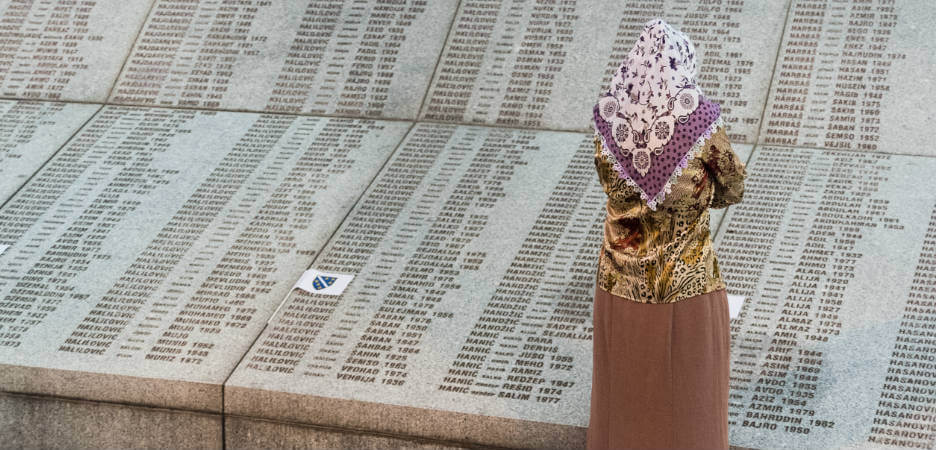Ratko Mladić has been convicted, but justice hasn’t entirely been served in The Hague.
The conviction of Ratko Mladić in The Hague for genocide, war crimes and crimes against humanity committed during the Bosnian War hardly came as a big surprise. The evidence was strong and stacked up against him. Nearly 600 people gave evidence during his five-year trial, including many of his victims. Any robust defense of the charges was always going to be a challenge for Mladić even with the support of a defense team comprising the most talented lawyers in the world.
Of course, his conviction has been widely hailed in the media as an important milestone for international criminal justice, since he was one of the first people to be indicted by an international criminal tribunal since Nuremberg. But his conviction also showcases how slow the cogs of international criminal justice seem to turn. Despite being indicted by the tribunal in 1995, Mladić managed to evade the clutches of the court until 2011, leading to much speculation about whether the tribunal really possessed any sway in the early days of its existence, and whether the international community supported its mission. It was only following political pressure on Belgrade from the European Union that the government renewed its appetite to apprehend him.
Mladić, dubbed the “Butcher of Bosnia,” commanded the Bosnian Serb forces during the massacre of nearly 8,000 Muslim men and boys at Srebrenica and the three-year siege of Sarajevo, which caused nearly 10,000 civilian deaths. Aside from one genocide charge, he was found guilty of all the other 10 counts, including a separate count of taking UN personnel hostage in an effort to thwart NATO airstrikes. Delivering the verdict, the presiding judge, Alphons Oria, held that the crimes “rank among the most heinous known to humankind” and rejected his mitigation pleas of good character, ill-health and diminished mental capacity.
Dogged by health problems, Mladić shakily occupied the defendant’s chair on November 22, but following a toilet break he was quickly removed again from court after a tirade of abuse aimed at the judges. His sentence of life imprisonment was handed down in his absence.
Only time will tell whether his conviction will bring closure to the families of his victims who are still searching for the remains of loved ones over two decades since the war. Ethnic tensions still persist in the former Yugoslavia, and many there regard Mladić as a hero who defended his people and believe that the judgment is a verdict against them as well.
US attorney Christopher Hale, who has worked at the tribunal, has gallantly argued that “the weight of empirical evidence demonstrates that justice is one of the most vital components to achieving durable peace.” But, in reality, there is very little evidence to suggest that the trials have brought meaningful reconciliation to the region.
Whatever view we choose to adopt, the statistics clearly speak for themselves. Division between ethnic communities has grown since the end of the war. For example, Banja Luka was once ethnically diverse — nearly 50% of its population were Bosnian Serbs, while Muslims and Croats represented 19% and 15% respectively. In 2017, Banja Luka is almost 90% ethnic Serb. Hard questions need to be asked about whether such trials can truly bring about meaningful reconciliation and durable peace to this post-conflict region when the data suggests that ethnic tensions are becoming more deeply entrenched in communities long after the conflict has ended.
The trial of Mladić will be the last at the UN International Criminal Tribunal for the Former Yugoslavia (ICTY) before it closes its doors at the end of this year, having arrested and tried more than 161 persons, including Slobodan Milošević — who died during his trial in 2006 – and the Bosnian Serb leader Radovan Karadžić, who was convicted in 2016 for his role in the Srebrenica genocide.
On the face of it, the tribunal seems to have achieved rather a lot. But some would argue, myself included, that the tribunal sidestepped the prosecutions of high-ranking commanders of the opposing armed factions in the war for alleged crimes. So, ultimately, it must be questioned not only whether justice has been achieved, but also whether the tribunal has laid down an accurate historical record of the events that occurred.
We are right to question the success of these institutions that market themselves as beacons of international justice, but the process by which individuals are selected by these institutions for investigation and prosecution also needs to be placed under the spotlight.
*[This article was originally published by The Conversation.] ![]()
The views expressed in this article are the author’s own and do not necessarily reflect Fair Observer’s editorial policy.
Photo Credit: Giovanni Vale / Shutterstock.com
Support Fair Observer
We rely on your support for our independence, diversity and quality.
For more than 10 years, Fair Observer has been free, fair and independent. No billionaire owns us, no advertisers control us. We are a reader-supported nonprofit. Unlike many other publications, we keep our content free for readers regardless of where they live or whether they can afford to pay. We have no paywalls and no ads.
In the post-truth era of fake news, echo chambers and filter bubbles, we publish a plurality of perspectives from around the world. Anyone can publish with us, but everyone goes through a rigorous editorial process. So, you get fact-checked, well-reasoned content instead of noise.
We publish 2,500+ voices from 90+ countries. We also conduct education and training programs
on subjects ranging from digital media and journalism to writing and critical thinking. This
doesn’t come cheap. Servers, editors, trainers and web developers cost
money.
Please consider supporting us on a regular basis as a recurring donor or a
sustaining member.
Will you support FO’s journalism?
We rely on your support for our independence, diversity and quality.







